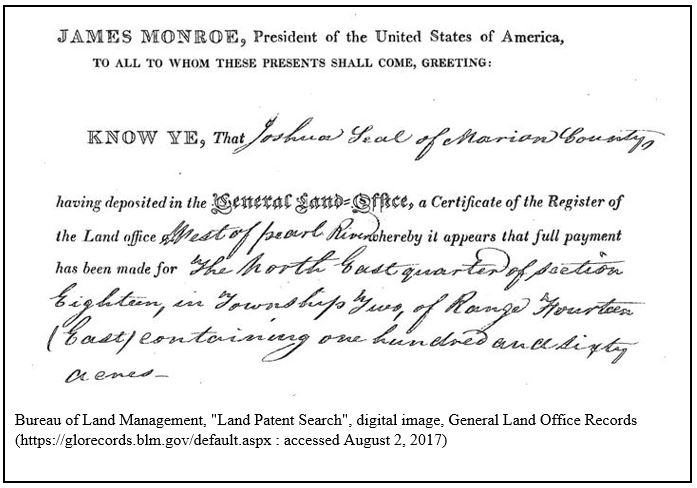Let’s see what else we can learn about Joshua Seale from his business dealings in Marion County.
In 1813, Joshua paid taxes in Marion County.[1. E. Russ Williams, Marion County Mississippi Misc Records. (Easley, South Carolina:Southern Historical Press, 1986), 368.] As you recall, he sold property in his former home of Anson County, North Carolina in 1810, and then traveled to Marion County, probably arriving in 1812. By 1813, he had already selected a location for a home and begun the process of clearing the land.[2. 1816 Mississippi Territorial Census, population census of Marion County, p. 3, Joshua Seal; digital image, “Mississippi Compiled Censuses and Census Substitutes Index, 1805-1890”, Ancestry.com (www.ancestry.com>search>card catalogue>Mississippi : accessed July 30, 2017).] He probably had help from his 15 year old son Lewis.
In 1814, Joshua signed a petition along with his neighbors requesting the US Congress build a road in Marion County.[3. Clarence Carter, Territorial Papers of the United States. Washington, DC:US Government Printing Office, 1938.] This shows that Joshua was at least friends with his neighbors, and possibly a leader in the community. It also shows a tendency to cooperate with the government instead of avoiding it, a tendency that is confirmed by the fact that Joshua and family never missed a US Census.
In 1815, the Orphans Court for Marion County granted Joshua and two others a license to sell spirits.[4. Williams, Marion County, p. 262] Not only does this show more community involvement on Joshua’s part, but it shows a tendency towards being industrious. Remember, Joshua had 160 acres of virgin forest to clear! Only a hard worker would take on a second job.
show more community involvement on Joshua’s part, but it shows a tendency towards being industrious. Remember, Joshua had 160 acres of virgin forest to clear! Only a hard worker would take on a second job.
The next year Joshua recorded a mark for his livestock.[5. Marion County, Mississippi, Misc. Records, January 10, 1816, Marion County Chancery Clerk, Columbia.] This could be an indication that things were shaping up on the Seale property, and that he may have gotten some land cleared and barns built.
Joshua’s generosity is demonstrated in 1820, when he pays part of the county taxes for James Phillips, who was his son-in-law’s father.[6. “Marion County Tax Reciept”, 1820; box 4Ja4; Dolph Briscoe Center for American History, Austin, Texas.] As we will see later, this kind of generosity is repeated throughout Joshua’s life.
Finally, in 1821, Joshua receives title to the land he has been working on for several years. On December 19, 1821 the US Government gave Joshua title to his land on the Pearl River.[7. Bureau of Land Management, “Land Patent Search, “digital images, General Land Office Records (https://glorecords.blm.gov/search/default.aspx?searchTabIndex=0&searchByTypeIndex=0 : accessed July 30, 2017).] This indicates what I think is tremendous patience on Joshua’s part. He had been working to improve this piece of property for six years or more before he actually got title to it. I don’t know if I could do that!
Through the records that Joshua left behind, we can surmise that Joshua Seale was a hard working, industrious man, that was an active member of his community, had the patience necessary to work toward a long term goal, and had a generous heart. No telling what his personal life will tell us!